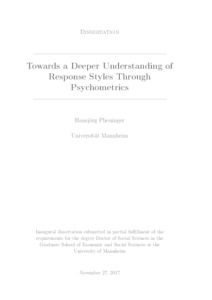|
Towards a deeper understanding of response styles through psychometrics
Plieninger, Hansjörg
![[img]](https://madoc.bib.uni-mannheim.de/44325/1.hassmallThumbnailVersion/Plieninger-2017-Towards%20a%20Deeper%20Understanding%20of%20Response%20Styles%20Through%20Psychometrics.pdf)  Vorschau |
|
PDF
Plieninger-2017-Towards a Deeper Understanding of Response Styles Through Psychometrics.pdf
- Veröffentlichte Version
Download (4MB)
|
|
URL:
|
https://madoc.bib.uni-mannheim.de/44325
|
|
URN:
|
urn:nbn:de:bsz:180-madoc-443254
|
|
Dokumenttyp:
|
Dissertation
|
|
Erscheinungsjahr:
|
2018
|
|
Ort der Veröffentlichung:
|
Mannheim
|
|
Hochschule:
|
Universität Mannheim
|
|
Gutachter:
|
Erdfelder, Edgar
|
|
Datum der mündl. Prüfung:
|
21 Februar 2018
|
|
Sprache der Veröffentlichung:
|
Englisch
|
|
Einrichtung:
|
Außerfakultäre Einrichtungen > GESS - CDSS (SOWI)
Fakultät für Sozialwissenschaften > Psychologische Methodenlehre u. Diagnostik (Meiser 2009-)
|
|
Fachgebiet:
|
150 Psychologie
|
|
Fachklassifikation:
|
THES_SOZ:
psychometrics, psychology, dissertation, response behavior,
|
|
Normierte Schlagwörter (SWD):
|
Psychometrie , Psychologie , Probabilistische Testtheorie , Dissertation , Antwortverhalten , Rasch-Modell
|
|
Freie Schlagwörter (Englisch):
|
response style , psychometrics , psychology , item response theory , dissertation
|
|
Abstract:
|
It is well known that respondents answer items not only on the basis of the question content, but also on the basis of their preferences for specific response categories. This phenomenon of so-called response styles has gained a lot of attention in both psychometric and applied work, and research has made steady progress in the last decades. However, there are still many open questions, and selected topics were addressed in three research papers that compose the present, cumulative thesis.
The first paper (Plieninger, 2016) focused on applied settings, where researchers often fear that response styles may threaten the data quality. However, it was unclear how large such biases can be, and this was investigated in simulation studies. Data contaminated by extreme responding and acquiescence were generated from a recently proposed IRT model under a wide range of conditions. Subsequently, the data were analyzed (e.g., Cronbach’s alpha, correlations) without controlling response styles, and the resulting bias was investigated. The analyses revealed that bias was small to negligible in many situations, but bias became larger the stronger the correlation between the target trait and response styles was.
The second paper (Plieninger & Heck, 2017) focused on specific psychometric models for response styles, namely, IR-tree models. We showed that these models can be subsumed under the class of hierarchical MPT models. Within this more general framework, we extended an existing model to acquiescence. Simulation studies showed that the Bayesian estimation procedure successfully recovered the parameter values, and an empirical example from personality psychology was used to illustrate the interpretation of the model. Apart from that, comparisons with existing approaches to acquiescence revealed that different concepts of this response style exists, namely, either in terms of a mixture or a shift process, and the proposed model makes it possible to contrast the two accounts.
The third paper (Plieninger, Henninger, & Meiser, 2017) focused on response formats, in particular, the Likert-type format and a recently proposed drag-and-drop format. It was hypothesized that the new format may allow to control response styles as indicated by previous research. We aimed to investigate the underlying mechanisms of this effect as well as possible consequences for reliability and validity. However, a small advantage of the new format over a Likert-type format was only found in one condition where the categories were aligned in two columns. The other conditions, where categories were presented in one column, showed no advantage over the Likert-type format in terms of response styles, reliability, and validity.
In summary, the present thesis has led to a deeper understanding of response styles. Open questions that could not be addressed or were brought up are discussed herein, and routes for future research are described.
|
 | Dieser Eintrag ist Teil der Universitätsbibliographie. |
 | Das Dokument wird vom Publikationsserver der Universitätsbibliothek Mannheim bereitgestellt. |
 Suche Autoren in Suche Autoren in
Sie haben einen Fehler gefunden? Teilen Sie uns Ihren Korrekturwunsch bitte hier mit: E-Mail
Actions (login required)
 |
Eintrag anzeigen |
|
 ORCID: 0000-0002-4416-300X
ORCID: 0000-0002-4416-300X



 Suche Autoren in
Suche Autoren in